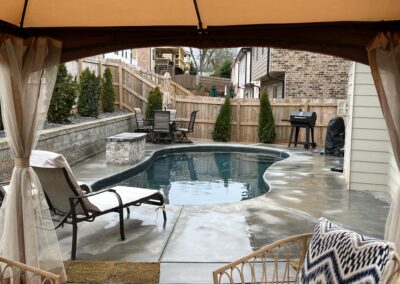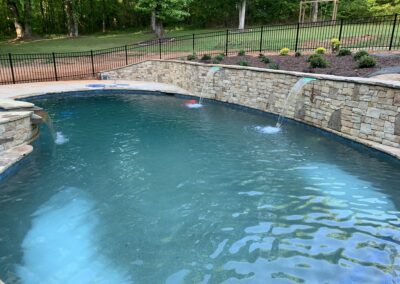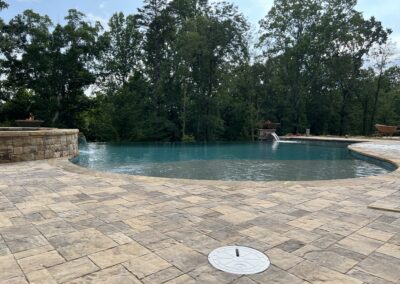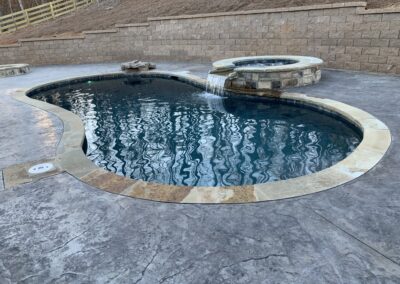We have Designed and Built Concrete/Gunite Pools for over 40 years
Concrete pools are durable, flexible, customizable, and available in a wide range of shapes and sizes. There’s not much difference between shotcrete and gunite pools, both are types of concrete. A concrete pool usually takes around 60 days to build after prep, but it depends on the project’s size.
Because of its versatility and durability, gunite has become the standard for both residential and commercial swimming pool construction. Whether you want to build a pool with sharp edges, smooth curves, or both, gunite will deliver.
Durability
Concrete has excellent durability which makes it a worthy choice.
Versatility
Concrete pools will fit and adapt to most backyard landscapes.
Easy Maintenance
If your pool is properly designed, maintenance is an easier task.
Your own oasis.
What is a Concrete Pool?
Cement is actually a component of concrete, not the same thing, even though we tend to use the words interchangeably. Concrete is a mix of water, cement, sand, and a coarse aggregate (stone or gravel).
A concrete pool shell is created by spraying either gunite or shotcrete. Gunite is a dry mix with water in the sprayer, whereas shotcrete is already wet. These two methods produce the same result and have no significant difference in quality if done correctly.
After the concrete is sprayed on, it needs time to cure and reach its full potential. It doesn’t dry, per se. It hardens and strengthens in a long process called curing. For a pool shell, this takes about 28 days.
The strength of concrete is measured by psi, the pounds per square inch necessary to crush it. An average concrete strength is 3500-4000 psi. It’s controlled by how many sacks of cement are added to the mix—the more cement, the stronger the concrete. The aggregate (the rocks or gravel mixed in) has a very high compressive strength: it takes a lot of pressure to crush concrete.
However, concrete has a very low tensile strength (against a force that pulls it apart), so when you try to bend or flex it, the force pulls on the surface and cracks it. On concrete pools, this can cause surface or structural cracks. Not ideal. Pool builders compensate for that by framing the concrete in a web of steel. The steel and concrete together create a solid structure that can bend and flex to withstand forces of water, earth, and gravity.
Here’s a few concrete pools we have recently completed.
Lanier Concrete Pool Benefits
- Home Resale Value — Your home values could potentially increase with the installation and construction of a concrete swimming pool. A well-made swimming pool is an investment that can increase the resale value of your home. Because a concrete inground pool is a permanent structure it is an extension of your home.
- Backyard Ambiance — The addition of a swimming pool completely transforms the look of your backyard, taking it from ho-hum to a luxurious oasis. When you add in landscaping, decking and even an outdoor kitchen area, you can move your indoor living outside!
- Your Unique Style — There are so many choices available when building an inground swimming pool with concrete. There are various colors, designs / shapes and finishes you can use to make your pool design truly unique.
- Durability & Longevity — Concrete is one of the most durable building materials for swimming pools. A concrete swimming pool will last for decades and it isn’t prone to rips or tears.
- Design Options are Limitless — With a concrete inground pool you can have virtually any design for your swimming pool, such as a freeform pool. The design and shape can be as varied as your imagination.



